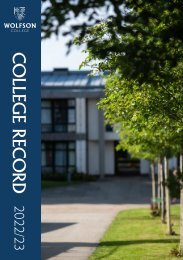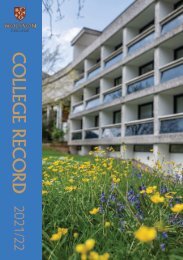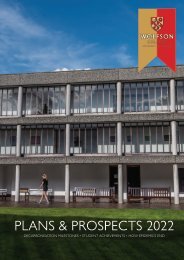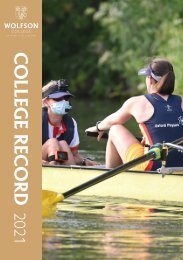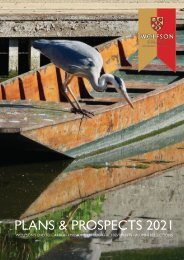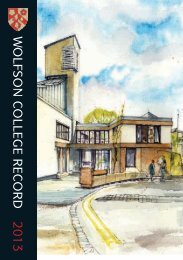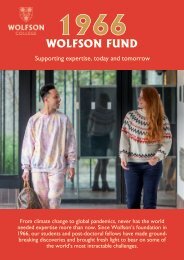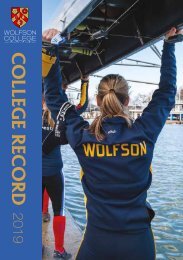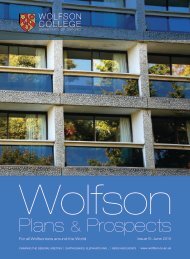Plans & Prospects 2023
Plans & Prospects is the annual magazine for alumni and friends of Wolfson College at the University of Oxford. We hope that you enjoy reading about life here at Wolfson, and welcome your feedback or article suggestions for next year's issue.
Plans & Prospects is the annual magazine for alumni and friends of Wolfson College at the University of Oxford. We hope that you enjoy reading about life here at Wolfson, and welcome your feedback or article suggestions for next year's issue.
You also want an ePaper? Increase the reach of your titles
YUMPU automatically turns print PDFs into web optimized ePapers that Google loves.
The healing power of movement<br />
Student profile<br />
Chatting with first-year psychiatry DPhil student and Oxford University salsa coach Brennan Delattre, it’s tempting to book<br />
yourself into your nearest dance class. Brennan is the first holder of the Rachel Conrad Scholarship for the study of Clinical<br />
Depression, a unique endowed scholarship established in 2021 thanks to a generous legacy from Reuben Conrad CBE, a longtime<br />
member of Common Room. Her passion for helping others heal through movement is infectious and, with future plans to<br />
work with the NHS on reducing waiting times for mental health patients, Brennan’s is certainly a career to watch.<br />
DPhil Psychiatry, 2022<br />
Back in Minnesota, where I’m from, my<br />
aunt helped with cotillion. It was really<br />
social and etiquette training dance - not<br />
quite big southern belle dresses. When I<br />
was about 10 years old, they didn’t have<br />
enough young girls in my age category,<br />
so my aunt persuaded me to sign up.<br />
When I started it meant white gloves<br />
(and not really wanting to touch the<br />
boys), but as it was a family thing I stuck<br />
with it, and I ended up teaching when<br />
I was just 16. I continued right through<br />
to when I was 18 before I went off<br />
to Middlebury College in Vermont to<br />
study neuroscience. It was there that I<br />
got really into swing dancing and also<br />
capoeira (a dancelike martial art from<br />
Brazil, performed to the accompaniment<br />
of call-and-response choral singing and<br />
percussive instrumental music) which<br />
I discovered through my orientation<br />
trip for my undergrad. Members of<br />
the university were teaching it in<br />
Portuguese and I went in with no prior<br />
knowledge or experience and just really<br />
fell in love with it. I studied abroad in<br />
Brazil and I was lucky enough to see<br />
capoeira performed by people of many<br />
sociodemographic backgrounds, races,<br />
and genders.<br />
People would walk into these capoeira<br />
classes and they would walk out saying<br />
that they felt better. And I started<br />
hearing people tell me stories of how<br />
“capoeira saved my life” or “it helped<br />
me get through my divorce”. I was<br />
studying neuroscience at the time and I<br />
used to think I was going to be a clinical<br />
psychologist, but that came with the<br />
difficulty of needing to pick a country,<br />
or a state because it’s really difficult to<br />
get re-certified between places. And as<br />
someone who loves to travel, it didn’t<br />
make a lot of sense to me.<br />
I really love research and my background<br />
is neuroscience. I consider myself more<br />
of a social psychologist and somebody<br />
who’s interested in intervention efficacy,<br />
but in socially-based interventions to<br />
supplement pharmacologically-based<br />
interventions. So as I was learning<br />
about neuroscience whilst also watching<br />
people in capoeira walking in and out of<br />
these classes feeling better, I began to<br />
wonder if that’s something that could be<br />
harnessed into an intervention? What<br />
is it about capoeira? Is it the singing? Is<br />
it the dancing? Is it the interpersonal<br />
movement in synchronisation? What is<br />
it and how could that then be used to<br />
benefit people en masse?<br />
Its potential as an intervention is huge,<br />
because it’s cost-effective, non-invasive,<br />
and really quite accessible. As my PhD<br />
has progressed I have moved from<br />
capoeira to salsa dance, after interviews<br />
revealed a preference in young people,<br />
but the active component I’m most<br />
interested in is the co-operative<br />
movement, as it seems like a really<br />
important avenue for research. This is<br />
especially true given the current mental<br />
health crisis that we’re in following the<br />
pandemic.<br />
Currently, if you try to find mental<br />
health care through the NHS, waiting<br />
times are really long. There’s research<br />
that shows that as you wait, you will get<br />
Above & Left: Brennan as coach for the<br />
Oxford University Salsa Society /<br />
Credit: BubbleGum Media<br />
worse and you will most likely do worse<br />
in treatment once you get it. There are<br />
low-intensity interventions already in<br />
use, like exercise or guided self-help, but<br />
there are also a lot of people who are<br />
teaching things like salsa and capoeira in<br />
the community. Our theory is that these<br />
things could be helpful in the same way<br />
as other low-intensity interventions. If<br />
the evidence backs the hypothesis, we<br />
could then connect existing resources<br />
in the community to an existing need,<br />
getting people off the waiting list in a<br />
way that could be really beneficial for<br />
them and the healthcare system.<br />
What drew me to neuroscience,<br />
psychology and psychiatry is wanting to<br />
better understand how humans work,<br />
but also to facilitate connecting existing<br />
resources to the people who need them.<br />
Dance has been so good in my own<br />
life and I have anecdotally wandered<br />
through the world hearing similar stories<br />
from lots of other people internationally.<br />
So if the research my PhD is based on<br />
says that it would be useful to have<br />
something like this as part of NHS<br />
treatments, then that would be amazing.<br />
13



